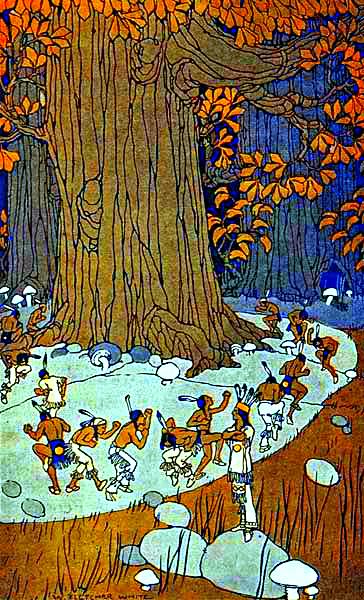 |
Canku Ota
|
 |
|
(Many Paths)
|
||
|
An Online Newsletter
Celebrating Native America
|
||
|
January 2017 - Volume
15 Number 1
|
||
|
|
||
|
The Little People
And The Greedy Hunters
|
||
|
by Native North American
Travelling College
|
||
| A Seneca legend
The little people who lived in the early world left their carvings to beautify rocks and cliffs and caves. And they helped the early Native Americans. Small though they were, the Little People were so strong that they killed many of the monster animals that were dangerous to man. "Our mission is to help you," a Little Person once told a Seneca hunter. The bones of extinct animals found in their travels, the Seneca believed, were the bones of the monsters that had been destroyed by the Little People.
The following legend of the Seneca, called a true story by the man who told it, reveals a little about the Little People and also an attitude toward greediness and waste expressed in the stories of several North American tribes. One time a party of hunters went on a hunting expedition to a region far from their homes. There they found game plentiful, and they killed many animals. In order to preserve and take home with them the skins and furs of these animals, they threw away large amounts of the meat. When the hunters had finished preparing the hides in that region they moved on farther north. There game was scarce. They found so little that they were soon in need of the meat they had thrown away. At last they were so hungry that they were near starvation. After a while one of the Little People came among them. "You are being punished because of your wastefulness and greed," he said. "You know that you should not kill so many animals and that you should not throw away their flesh." "What must we do in order to obtain food now? " asked the hungry hunters. "You must give up all the skins and furs you have collected and prepared for use," replied the little person. "If you do not give them up, you will have to starve." The hunters talked among themselves and then asked, "How much time will you give us to discuss the matter?" "When you have made your decision, just tap on a rock. One of my people will hear you and come for your answer." For a long time the hunters discussed the matter, for they did not want to part with the hides. At last they decided to ask the Little People for better terms. So they tapped on a rock, and one of the Little People appeared before them. "If the amount of food you give us is small," said the hunters, "we will starve rather than accept your terms. For if we do not have enough food, we shall be unable to reach home. And we are in strange country. Give us a guide to show us the way to our land." "I cannot grant your request unless my people give their consent," answered the little man. "But I will bring you enough food to relieve your present hunger." He then led them to a large cave, in which the hunters found some food and he told them to remain there until the Little People gave them permission to leave. Next day the little person came back with a cheering message. "You have been forgiven for your greed and your wastefulness," he told the hunters. "My people have decided to provide you with food, without forcing you to give up your furs. You are to remain in the cave until someone calls for you." About midnight, when the men were wakened, they were surprised to find themselves in their first camping place. When they told their Seneca friends about their experiences, they ended with the statement: "We were brought back by our friends, the Little People. The hunters used those words whenever they told the story, and they never forgot the lesson the Little People had taught them. |
||
|
|
||
|
|
||
| Canku Ota is a free Newsletter celebrating Native America, its traditions and accomplishments . We do not provide subscriber or visitor names to anyone. Some articles presented in Canku Ota may contain copyright material. We have received appropriate permissions for republishing any articles. Material appearing here is distributed without profit or monetary gain to those who have expressed an interest. This is in accordance with Title 17 U.S.C. Section 107. | ||
|
Canku Ota is a copyright ©
2000 - 2017 of Vicki Williams Barry and Paul Barry.
|
||
 |
 |
|
|
The "Canku
Ota - A Newsletter Celebrating Native America" web site and
its design is the
|
||
|
Copyright ©
1999 - 2016 of Paul C. Barry.
|
||
|
All Rights Reserved.
|
||
